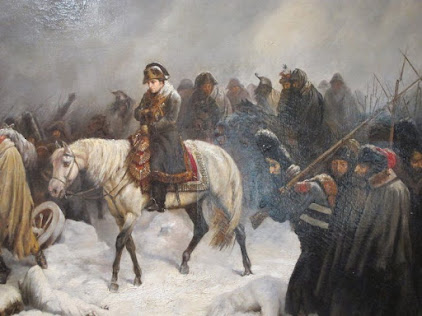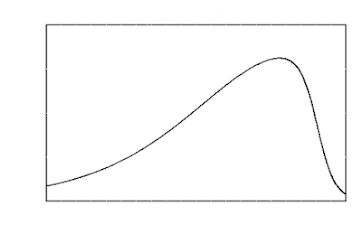There are many more examples. Think of Adolf Hitler: successful in everything he did, but he failed to bomb Britain to submission. Then, he doubled down by attacking the Soviet Union in 1941 (same mistake as Napoleon). Disaster ensued. Or of Benito Mussolini. Everything he did was a success until he decided to join Germany in WWII. Some of the early Italian moves in the war, as the attack on France in 1940, could be defined as successes. But they were just a prelude to disaster. Later on, a completely clueless Mussolini bungled from a defeat to another, so much that one wonders how was it possible for a single man to do so much damage. And let's finish with an honorable mention for Saddam Hussein, who must have believed he was the reincarnation of the ancient Islamic warriors when he ordered the Iraqi army to attack Iran in 1980. It was a victory for Iraq, but at an enormous human and economic cost. Then, Hussein doubled down by invading Kuwait, and you know what happened.
I think there is a certain logic in these stories. It is a basic rule that goes as "success doesn't teach you anything." The human mind is easily deceived by overinterpreting favorable events and successful people become convinced that what was just a stroke of luck was instead due to their superior intuition or intelligence. The result is that they kept doing whatever they found that was successful in the past. And not just that. If they found something that worked, then people tend to repeat it on a larger scale. It is the "doubling down strategy."
In the roulette game, the doubling down strategy is known as the "martingale." You choose a color, red or black, and you double your bet on it until you win. The idea is that you may suffer a series of losses but, eventually, you'll recoup them and make a profit when your color comes out.It is unbelievable how many people think that the martingale is a good idea. The problem is that it looks easy and it seems to work. Unfortunately, as I discuss in my book "The Seneca Effect," it is a fast lane toward collapse. Eventually, you'll face a string of losses long enough to ruin you and, at that point, you'll be torn to pieces by the claws of the black swan.
Pompey in Jerusalem, Napoleon at Borodino, Hitler and Mussolini in Russia, Saddam Hussein in Kuwait, they suddenly found themselves facing something that was much larger than they had expected and that led to their rapid ruin: the Seneca Cliff:
Now, I think you understand the point I wanted to make, even though I will not explicitly say what I mean (I have already lost a blog to censorship). During the past two years, we have seen our leaders doubling down several times and, so far, they have been successful. So much that they keep doing that, raising the stakes and the threats at every step.
Will they overextend themselves and create their own ruin? It may well be. If this is the case, we can detect the transition moment when they arrive to a doubling that they can barely afford. Like Napoleon at Borodino, they suddenly see the cost of one more of those victories that, earlier on had seemed to them cheap and easy.
Are we starting to see that? Maybe not yet, but some signs of fatigue are starting to appear. If we are approaching the peak of the Seneca Curve, their downfall could be rapid. And also very noisy.
_____________________________________________________________
(*) Tolstoy describes the battle of Borodino in his "War and Peace" novel. It does not pretend to be a historical study, but it does make the point that, once the battle was started, Napoleon had no more control over it. He gave orders that were not executed on the basis of information that was already obsolete when he received it.
[Napoleon's] troops were the same, his generals the same, the same preparations had been made, the same dispositions, and the same proclamation courte et energique, he himself was still the same: he knew that and knew that he was now even more experienced and skillful than before. Even the enemy was the same as at Austerlitz and Friedland- yet the terrible stroke of his arm had supernaturally become impotent.
All the old methods that had been unfailingly crowned with success: the concentration of batteries on one point, an attack by reserves to break the enemy's line, and a cavalry attack by "the men of iron," all these methods had already been employed, yet not only was there no victory, but from all sides came the same news of generals killed and wounded, of reinforcements needed, of the impossibility of driving back the Russians, and of disorganization among his own troops.
Formerly, after he had given two or three orders and uttered a few phrases, marshals and adjutants had come galloping up with congratulations and happy faces, announcing the trophies taken, the corps of prisoners, bundles of enemy eagles and standards, cannon and stores, and Murat had only begged leave to loose the cavalry to gather in the baggage wagons. So it had been at Lodi, Marengo, Arcola, Jena, Austerlitz, Wagram, and so on. But now something strange was happening to his troops.



